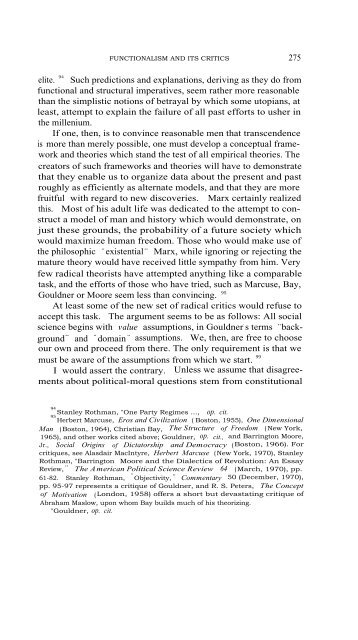FUNCTIONALISM AND ITS CRITICS - Intercollegiate Studies Institute
FUNCTIONALISM AND ITS CRITICS - Intercollegiate Studies Institute
FUNCTIONALISM AND ITS CRITICS - Intercollegiate Studies Institute
You also want an ePaper? Increase the reach of your titles
YUMPU automatically turns print PDFs into web optimized ePapers that Google loves.
<strong>FUNCTIONALISM</strong> <strong>AND</strong> <strong>ITS</strong> <strong>CRITICS</strong> 275<br />
elite. 94<br />
Such predictions and explanations, deriving as they do from<br />
functional and structural imperatives, seem rather more reasonable<br />
than the simplistic notions of betrayal by which some utopians, at<br />
least, attempt to explain the failure of all past efforts to usher in<br />
the millenium.<br />
If one, then, is to convince reasonable men that transcendence<br />
is more than merely possible, one must develop a conceptual framework<br />
and theories which stand the test of all empirical theories. The<br />
creators of such frameworks and theories will have to demonstrate<br />
that they enable us to organize data about the present and past<br />
roughly as efficiently as alternate models, and that they are more<br />
fruitful with regard to new discoveries. Marx certainly realized<br />
this. Most of his adult life was dedicated to the attempt to construct<br />
a model of man and history which would demonstrate, on<br />
just these grounds, the probability of a future society which<br />
would maximize human freedom. Those who would make use of<br />
the philosophic " existential " Marx, while ignoring or rejecting the<br />
mature theory would have received little sympathy from him. Very<br />
few radical theorists have attempted anything like a comparable<br />
task, and the efforts of those who have tried, such as Marcuse, Bay,<br />
Gouldner or Moore seem less than convincing. 95<br />
At least some of the new set of radical critics would refuse to<br />
accept this task. The argument seems to be as follows: All social<br />
science begins with value assumptions, in Gouldner's terms " background<br />
" and " domain " assumptions. We, then, are free to choose<br />
our own and proceed from there. The only requirement is that we<br />
must be aware of the assumptions from which we start. 99<br />
I would assert the contrary. Unless we assume that disagreements<br />
about political-moral questions stem from constitutional<br />
94<br />
Stanley Rothman, "One Party Regimes ..., op. cit.<br />
95<br />
Herbert Marcuse, Eros and Civilization ( Boston, 1955), One Dimensional<br />
Man ( Boston, 1964), Christian Bay, The Structure of Freedom (New York,<br />
1965), and other works cited above; Gouldner, op. cit., and Barrington Moore,<br />
Jr., Social Origins of Dictatorship and Democracy (Boston, 1966). For<br />
critiques, see Alasdair MacIntyre, Herbert Marcuse ( New York, 1970), Stanley<br />
Rothman, "Barrington Moore and the Dialectics of Revolution: An Essay<br />
Review, " The American Political Science Review 64 (March, 1970), pp.<br />
" "<br />
Objectivity, Commentary 50 (December, 1970),<br />
61-82. Stanley Rothman,<br />
pp. 95-97 represents a critique of Gouldner, and R. S. Peters, The Concept<br />
of Motivation (London, 1958) offers a short but devastating critique of<br />
Abraham Maslow, upon whom Bay builds much of his theorizing.<br />
"Gouldner, op. cit.
















